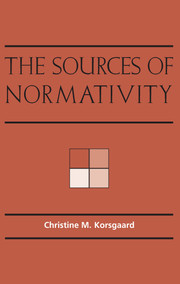Book contents
- Frontmatter
- Contents
- Notes on the contributors
- Acknowledgments
- Introduction
- Prologue: Excellence and obligation a very concise history of western metaphysics 387 bc to 1887 ad
- 1 The normative question
- 2 Reflective endorsement
- 3 The authority of reflection
- 4 The origin of value and the scope of obligation
- 5 Reason, humanity, and the moral law
- 6 Morality and identity
- 7 Universality and the reflective self
- 8 History, morality, and the test of reflection
- 9 Reply
- Bibliography
- Index
9 - Reply
Published online by Cambridge University Press: 20 May 2010
- Frontmatter
- Contents
- Notes on the contributors
- Acknowledgments
- Introduction
- Prologue: Excellence and obligation a very concise history of western metaphysics 387 bc to 1887 ad
- 1 The normative question
- 2 Reflective endorsement
- 3 The authority of reflection
- 4 The origin of value and the scope of obligation
- 5 Reason, humanity, and the moral law
- 6 Morality and identity
- 7 Universality and the reflective self
- 8 History, morality, and the test of reflection
- 9 Reply
- Bibliography
- Index
Summary
My commentators have raised many important questions about, and made some very forceful objections to, what I have had to say in these lectures. I can only wish that I could give satisfactory responses to them all. In what follows, I address just a few of the points which they have raised. Specifically, in section 11 address the question why we must will in accordance with a universal law. In section 2 I discuss some ways in which, according to my commentators, my account of obligation departs from Kant's, to its detriment, and I try to defend myself both against the claims of departure and of detriment. In section 3 I discuss the status of desire, both in Kant's account and in my own. In section 4 I take up the question whether my focus on the idea of identity makes my account of moral motivation unattractively egoistic. Finally in section 5 I consider some issues about the relationship between giving a psychological explanation of the sense of obligation, and giving a justification of obligation itself.
AN OLD QUESTION RAISED AGAIN: THE UNIVERSALIZABILITY REQUIREMENT
Near the beginning of lecture 3 (3.2.3), I cited the argument by which Kant undertakes to establish that we must submit our maxims to a test of universalizability.
- Type
- Chapter
- Information
- The Sources of Normativity , pp. 219 - 258Publisher: Cambridge University PressPrint publication year: 1996
- 5
- Cited by



